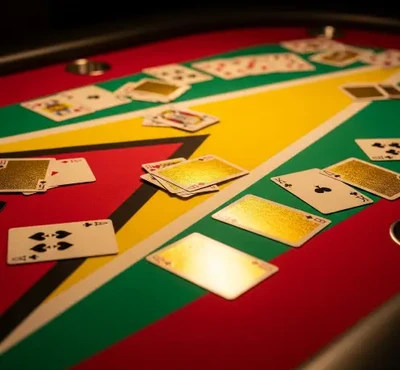
Poker in Guyana - Top Players and the Future of the Game
Poker in Guyana - Top Players and the Future of the Game
When asked to name the world’s leading poker nations, Guyana doesn’t immediately spring to mind. As the birthplace of the modern game, the US dominates the scene, while players from Europe, Brazil and beyond have made their presence felt on the biggest stages.
But the South American nation with a population of less than 800,000? Not really. At least not yet.
Propelled by the vast customer bases of legit online casinos in the US, the global poker industry now rakes in over $70 billion a year. In that context, Guyana’s poker footprint remains tiny. Still, every poker nation has to start somewhere, and there are signs the game is taking root.

With small poker nights and home games springing up around the country, poker’s presence in Guyana is on the rise. Bitten by the bug in games around the kitchen table, many players naturally progress to the online scene, where low-stakes games and freerolls provide the ideal training ground.
Offering benefits such as SSL encryption, fast payouts, and 24/7 action, online poker also serves as a stepping stone to live tournaments. Having honed their skills at home and online, several Guyanese players have taken a seat to face the opposition across the international felt.
Guyana’s All-Time Money List
- Joshua Abdol – Live Earnings: $18,209
- Leonard Gomez – Live Earnings: $2,750
- Peter Abdool – Live Earnings: $2,005
- Philip Jaiserrising – Live Earnings: $1,531
- Ian James Christopher Fung – Live Earnings: $1,029
- Paul Matuszczak - Live Earnings: $815
$18,209 in live tournament earnings is nothing to scoff at and good for the top spot among Guyanese players. However, that total places Joshua Abdol only 121,989th on the overall money list across all nations.
For comparison, 2025 World Series of Poker Main Event champ, Michael Mizrachi, is only 32nd on the list despite that $10 million haul. Top spot belongs to another US player, Bryn Kenney, with an eye-watering $78,246,828 in career winnings.
The results may be modest, but they at least represent a start. It’s encouraging that Guyanese players are picking up international cashes, however small. Every deep run by an Abdol, Gomez, or Abdool increases visibility and inspires the next generation of poker hopefuls.
Is Gambling Legal in Guyana?
The short answer is yes. The long answer is a little more complicated.
Gambling legislation in Guyana began with the Betting Act of 1902, which made an exception for state-approved lotteries but banned almost everything else.
Nothing much changed until 2007, when land-based casinos were legalised as part of a broader effort to stimulate tourism and attract foreign investment. The Gaming Authority of Guyana was created to oversee casino operations and licences. However, there hasn’t exactly been a mad rush to set up such premises.
In 2025, Guyana will have a total of two licensed land-based casinos:
- Guyana Princess Casino
- Carnival Casino
Both establishments are attached to hotel complexes. In theory, all Guyanese adults aged 18+ can legally play in these casinos. In reality, entry is often restricted to hotel guests, typically overseas visitors, making access difficult for locals.
Given the limited number of physical venues and their barriers to entry, most Guyanese players have little option but to head online. However, the legal status of online gambling remains ambiguous. While there are no explicit laws prohibiting online play, there is also no formal regulation. This legal grey area sees players turn to offshore platforms, which generally accept their business without restriction.
What’s Next for Poker in Guyana?
In recent years, Guyana’s economic focus has shifted to oil and natural resources, relegating gambling policy to the back seat. However, the policy shifts of 2007 suggest that officials are at least open to change.
Large-scale resort casino models like those seen in Las Vegas and Macau remain unlikely, given the significant financial investment and social risk. That said, officials have hinted at updates to the current regulatory framework. These changes may include issuing more casino licences and clearer online gambling regulations.
For now, poker in Guyana remains a small-scale affair driven by players with a love for the game. A clearer legal environment and a more welcoming attitude toward local players could act as the catalyst needed to take the game to the next level.
More casinos and better-regulated online play would create more games and tournaments for Guyanese players to grow their game. Who knows? Perhaps one day we’ll see the World Poker Tour schedule a stop in Georgetown – or at the very least, a few new names on the list of Guyana’s highest-earning poker stars.





